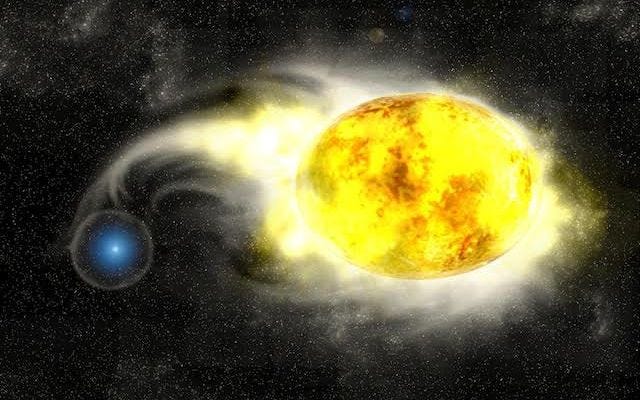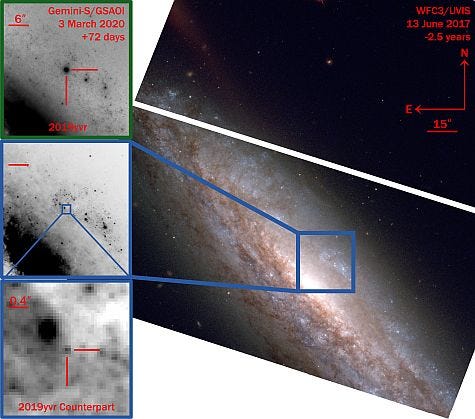# Unraveling the Mystery of Yellow Supernova 2019yvr
Written on
Chapter 1: The Enigma of Supernova 2019yvr
The phenomenon of yellow supernovae offers fascinating insights into the behavior of stars lacking hydrogen.

A puzzling and invisible star might be at the center of an intergalactic enigma! Image credit: KAVLI IPMU/Aya Tsuboi. As yellow stars approach the end of their life cycles, they are often enveloped in hydrogen, which obscures their hotter, blue interiors. Yet, the yellow star labeled 2019yvr, located 35 million light-years away from our planet, underwent a supernova without this hydrogen layer.
Charles Kilpatrick, a postdoctoral fellow at Northwestern University’s Center for Interdisciplinary Exploration and Research in Astrophysics (CIERA), states, “A star that explodes without hydrogen should be exceedingly blue and incredibly hot. It’s nearly inconceivable for a star to exhibit such low temperatures without having hydrogen in its outer layer. We examined every possible stellar model that could justify a star like this, but all of them necessitate the presence of hydrogen, which our observations of the supernova confirm it lacked. This challenges the limits of physical possibilities.”
Section 1.1: Investigating the Progenitor Star
Following the detection of supernova 2019yvr, astronomers were able to locate its progenitor star in recent images captured by the Hubble Space Telescope.

The Young Supernova Experiment leverages the Pan-STARRS telescope in Hawaii to observe distant supernovae shortly after their emergence. After identifying supernova 2019yvr, astronomers searched for images of the star taken by the Hubble Space Telescope two and a half years before the explosion.
Kilpatrick remarks, “Understanding the behaviors of massive stars right before they explode is a significant unsolved mystery. Observing this type of star immediately prior to its supernova is quite rare.”
A few months post-explosion, material expelled from 2019yvr collided with substantial amounts of hydrogen, suggesting that this gas was likely shed from the dying star in the years leading up to the supernova event.
Section 1.2: The Implications of Supernovae
“Have you ever witnessed a supernova? I have. I witnessed a star erupt and scatter the fundamental components of the Universe—other stars, planets, and eventually life itself. It was a supernova! A manifestation of creation!” — Ronald D. Moore, Battlestar Galactica.
Kilpatrick asserts, “The discovery of this star offers some of the most compelling evidence that stars undergo catastrophic outbursts that result in significant mass loss prior to a supernova explosion. If this star did experience such outbursts, it likely expelled its hydrogen several decades before the event.”
Another intriguing hypothesis suggests that the loss of hydrogen before the explosion of 2019yvr could be attributed to a smaller companion star, which may have stripped the dying star of much of its hydrogen. Astronomers will need to wait up to a decade for the light from the supernova to dim sufficiently to investigate the presence of any potential companion.
The findings of this research are elaborated in the Monthly Notices of the Royal Astronomical Society.
James Maynard, the founder and publisher of The Cosmic Companion, is a New England native now residing in Tucson with his wife, Nicole, and their cat, Max.
Did you find this article informative? Join us at The Cosmic Companion Network for our podcast, weekly video series, insightful newsletter, and news briefings on Amazon Alexa, among other offerings!